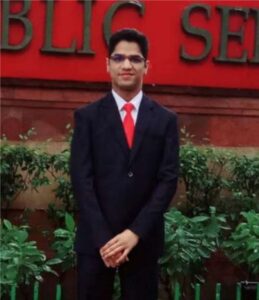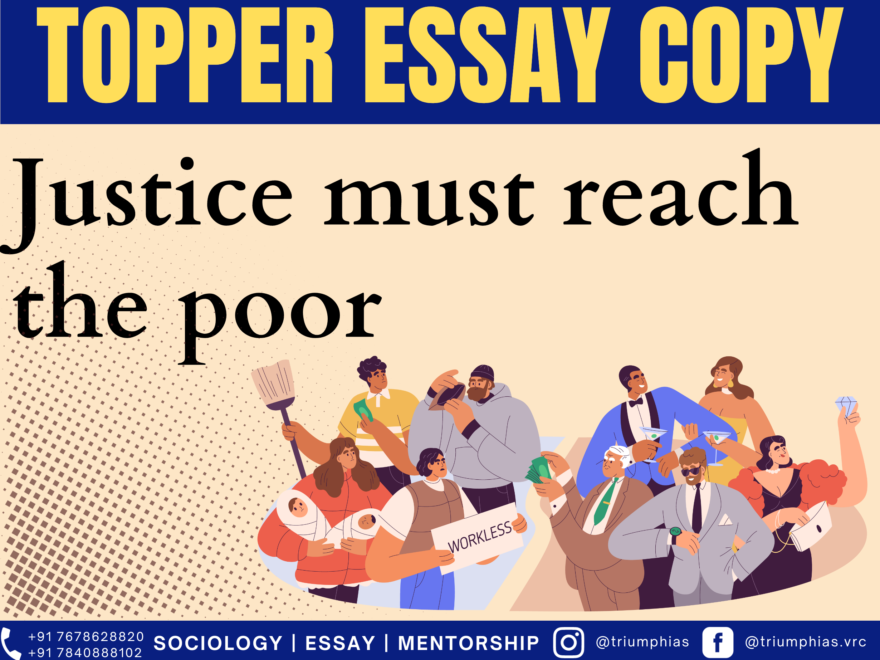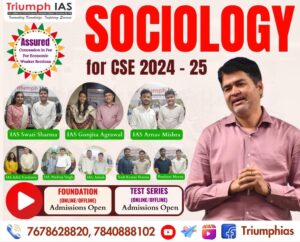IPS, Adarsh Kant Shukla

Essay Topic:
JUSTICE MUST REACH THE POOR
(Relevant for Essay Writing for UPSC Civil Services Examination)
JUSTICE MUST REACH THE POORIn a distant town of India, Ramesh, a construction worker, is set to start his day. Living in a single-room house dilapidated due to a lack of refurbishing, Ramesh lives with his ailing mother and bedridden father. Unfortunately, on his way to the site, Ramesh meets with an accident due to an overspeeding car hitting him from behind. This incident left Ramesh losing both his legs as his family could not afford immediate treatment and surgery. Ramesh decides to put up a legal fight against the driver of the car, who was a drunken brat of the city’s reputed businessman. But after frequent visits to local courts, spending thousands on stamps and notaries, repeated withdrawals of legal aid lawyers, Ramesh has not succeeded in his fight. Today, with his economic situation abysmal, his family under starvation, Ramesh has given up his fight and withdrawn the case. The virtue of justice is something that has been emphasized across time and ages. From Aristotle in the past to Babasaheb Ambedkar in the modern age, access to justice is considered indispensable for a progressive society. Our constitution makers ensured that from the lower strata to upper, scales of justice should be even which is reflected in Preamble’s objective of securing social, economic and political justice. However, after 73 years of our freedom, we are yet to witness a model of justice that encourages mobility for the downtrodden. Justice: a virtue unique Justice, in colloquial terms, is defined as the fairness or impartiality in decision making and resource distribution among the stakeholders. Classical thinkers had different views regarding justice. For example Aristotle believed justice to be honorific and teleorspecific i.e. which resource is being distributed decide the right path of justice, e.g. Justice is giving the flute to a good flute player. However, such a conception of justice goes against the poor, visible in Aristotle’s justification of slavery at one point of time. It was Rowls who gave a model of justice which takes into account the poor in society. Rowls believer that justice is unique virtue since it depends on bargaining tower of stakeholders. Poors are bound to be discriminated due to resource deficit, and low bargaining hence justice should be to ensure a model which benefits the least well off; essentially laying the foundation of Affirmative action. Poor and Justice : The ground reality Our state and society has evolved with a dream of equity and equality being hand in hand, through stories of yaksha and yudhishthira, Lord Rame and Raja Harishchandra. But as we examine deeper, a class bias can be seen in the functioning of our social order which indicates that poor’s access to justice is limited, hence it is justice which has to reach the poor. In the arena of social justice, contradiction are visible in multiple strata of gender, caste, religion and ethnicity. India is home to 24% of world’s poor with the poverty rate entrenched in scheduled caste, tribe and women led households. For women, justice is routed through local avenues like gram Panchayats . But the patriarchy entrenched in micro structures often skews the decisions against her. Khap Panchayat of Haryana are example of this evil. 81% of women are involved in informal sector which explain feminization of poverty and limitations of gender justice. Similarly, scheduled castes and tribes are often at the receiving ends of a skewed justice order. According to Amnesty International, 68% of hate crimes in India take place against. Dalits, most of which go unheard. The picture of economic injustice among poors is visible in the stark inequality in India. According to world Economic forum’s social mobility report, India is second most unequal country after Russia with top 1% of population having 42% of total assets. Sachar committee highlights how poverty and religion reinforce towards economic deprivation for Muslims. The political justice is also an area where poverty brings inherent disadvantage as 88% member of parliament are crorepati (ADR survey). Criminalization of polities and vote banking has been detrimental to wellbeing of poor; in political representation. This is later on manifested in the poor social indicators like health and education, reinforcing the injustice for poor and marginalized. In conventional sense. legal avenue is considered as the model source for justice. However legal justice has also been discriminatory if we analyze statistics. Today 66% of prisoners are under-trials with more than 3/4th belonging to poor category. Dr. A.P.J Abdul Kalam our former president, once expressed that Marcy petitions to president indicate socio-economic bias against poor in capital punishment. The advent of globalization and consumerism has led to issue of environmental injustice as well. More than 3 crore people have been deprived of their land out of which only 26% compensated. This is visible in 40% poverty rate among tribals; painting the better hold of crony capitalists in justice system. Despite these shortcomings, there have been some positive steps also. The efforts of government to realize Article 39A i.e. free legal aid to poor is visible in lok Adalats, Gram Nyayalya and family courts for justice to poor at doorsteps. In distributive justice, state efforts successfully pulled 271 million people out of poverty between 2005-15, Earning praise from United Nations. Initiatives like startup Indus are giving rise to Dalit Entrepreneurship and gender budgeted economy. Reservation for women in local elections and mobilization through SHGs like kudumbashree has also sewed well to improve rate of poverty among women. In social indicators Ayushman Bharat and POSHAN Abhiyan are there to ensure health benefits penetrate down to lower strata and new education policy 2020 makes provision for special education zones to provide literacy in backward areas. In environmental arena. Civil activism and tribunals like NGT have led to significant breakthroughs. The closure of POCSO project marks the triumph of environmental justice is emphasized in recent Aatmanirbhar Bharat too, where. Affordable renting house complexes aim at social justice for migrants. However, the persistence of injustice is due to short sightedness of policies. For example, Valmiki Ambedkar mission (VAMBAY housing), houses remain unoccupied due to documentary complexities and regulatory cholesterol. Similarly, ignorance of micro-analysis rencents in top down model of justice. e.g. 26% of girls avoid schools due to menstruation taboo this is often avoided due to lack of focus towards ground picture in policy framing. The institutions like Gram Nyayalaya face the shortage of stamp vendors. notaries and Nyayadhikaris. Parallel adjudications and increasing pendency have resulted in limited efficacy of these institutes. Civil courts like National commission of minorities has just one member left, compensation under POCSO is even under 10% and the member of cases bending in subordinate courts amounts to more than 80 lakh cases. Thus, it is time to make sure justice reaches the poor by taking concerted efforts. In order to improve decentralized justice a dedicated cadre of Nyayadhikaris should be introduced practice of Uncle Judges (nepotism in Judiciary) in subordinate courts should be discouraged. frivolous litigation should be penalized and vacancy should be immediately filled. The working days of court need to be improved to minimum 180-200 days per year Better incentives for legal aid lawyers would strengthen Lok Adalats as well. We can learn |
To master these intricacies and fare well in the Sociology Optional Syllabus, aspiring sociologists might benefit from guidance by the Best Sociology Optional Teacher and participation in the Best Sociology Optional Coaching. These avenues provide comprehensive assistance, ensuring a solid understanding of sociology’s diverse methodologies and techniques
Meta Tags:
Urbanisation, Blessing, Disguise, Economic Growth, Cultural Diversity, Environmental Challenges, India, Social Inclusion, Sustainable Development, SDG Goals, Urbanization is a blessing in disguise, Laxman Tiwari, Laxman Tiwari upsc, Laxman Tiwari CSE, Laxman Tiwari Essay copy, Laxman Tiwari Essay test copy

Why Vikash Ranjan’s foundation Classes for Essay?
Proper guidance and assistance are required to learn the skill of writing essay topics in CSE examination. VIKASH RANJAN SIR at TRIUMPH IAS guides students according to the Recent Trends of UPSC, making him the Best Essay Teacher for Essay writing UPSC.
At Triumph IAS, the Best Essay Writing Coaching platform, we not only provide the best study material and applied classes of Essay for IAS but also conduct regular assignments and class tests to assess candidates’ writing skills and understanding of the subject.
Choose The Best Essay Writing Teacher for IAS Preparation and Know our Approach for Essay?
- The Programme is Planned & Executed in a Way that You Write a good Essay for obtaining Effective Score of 140 Plus.
- In this programme we provide Classes on
- How to INTRODUCE The Topic in Context of the THEME of the Essay
- How to Elaborate & Explain the Topic-Theme on Temporal Scale & Sectoral Scale as well as Intellectual Scale in the MAIN BODY of the Essay.
- How to Sum up the Topic in CONCLUSION in Context of the Essay Topic Theme.
- ︎We will Teach You How to use the Knowledge Matrix of General Studies & Optional to write a Good Essay more Logically and Coherently.
- After the Classes You have to “Write to Learn & Learn to Score” .This means You have to Write the Essay Test Papers & Learn from the Feedback & Discussions.
Why Essay is Important and What We Offer in “Essay Test Series”?
- Triumph’s Essay Upgradation Test Series (Under Personal Guidance of Vikash Ranjan Sir) doesn’t only focus on improving student’s linguistic skills but also focus on improving student’s ability to comprehend the topic-sentence (subject) recall & relate the facts, concepts, propose thesis-statements, and logically assimilate the ideas & counter ideas with clarity in expression on temporal & Sectoral Scales of knowledge.
- Further students are provided one-on-one INTERACTION* Session with Vikash Ranjan Sir. Students get personal feedback on their strength and weaknesses, regarding what is ‘good about their essay and what more should be done to make it a better one’ by Vikash Ranjan Sir.
Why to take up this “Essay Test Series and Foundation” Course?
- Essay is Low hanging Fruit. Marks in Essay is Effectively Contributing in Final Selection in New Pattern of Mains Exam. With a Well Developed ‘Knowledge Matrix and Rigorous Practice’, One can Score upto 160 + in Essay. So IAS Aspirants should never Ignore Essay Preparation
- Inculcating Writing Competency in Essay for IAS, which is Different from Essay in English, Essay in School and College.
Follow us :
🔎 https://www.instagram.com/triumphias
🔎https://www.youtube.com/c/TriumphIAS
🔎https://t.me/VikashRanjanSociology
Find More Blogs…
| Compare and contrast Karl Marx’s and Max weber’s | Karl Marx- Historical Materialism |
| Position of Women In the Modern Indian Society | Sociology: Social system and pattern variables |
keyword: Justice must reach the poor,Justice must reach the poor,Justice must reach the poor,Justice must reach the poor,Justice must reach the poor,Justice must reach the poor,Justice must reach the poor,Justice must reach the poor,Justice must reach the poor,Justice must reach the poor,Justice must reach the poor,Justice must reach the poor,Justice must reach the poor,Justice must reach the poor, Justice must reach the poor,Justice must reach the poor,Justice must reach the poor,Justice must reach the poor


